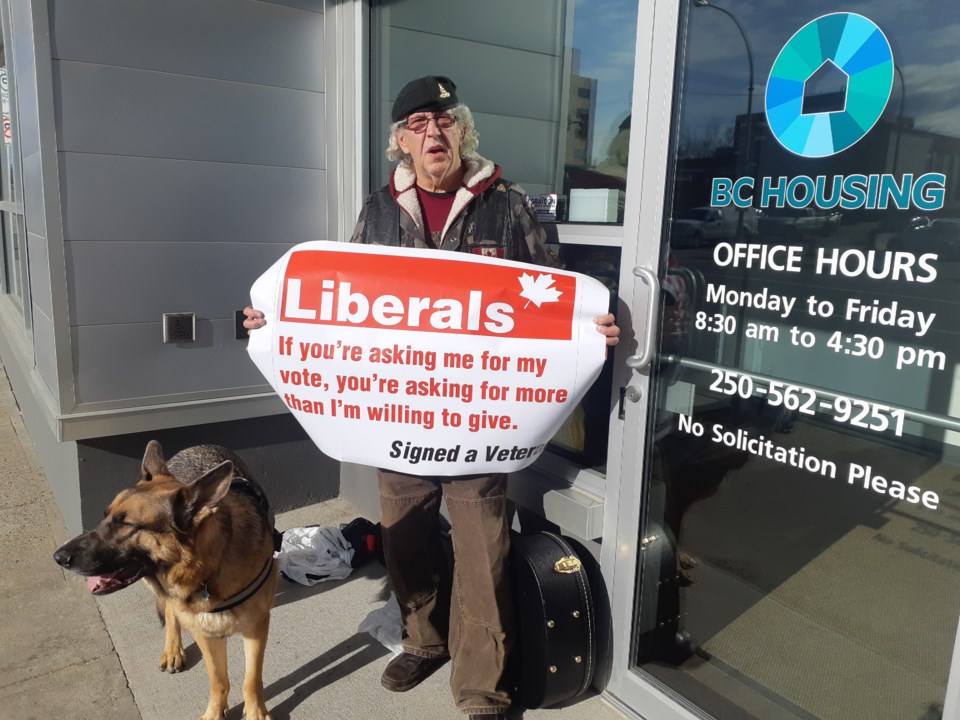Patrick Cannon just wants a place to call home.
The 61-year-old Canadian army veteran, whose tour of duty in Bosnia in the mid-1990s left him with post traumatic stress disorder, finally reached a breaking point last Saturday.
He and his German shepherd companion Gunner parked themselves in front of the closed office of the BC Housing on Second Avenue and held up a sign which read: "Liberals - If you're asking me for my vote, you're asking for more than I'm willing to give."
Evicted from his rented home since Aug. 4, Cannon has been living with friends, couch-surfing or housesitting since then and he's fed up with it. He owes $8,922 in tax payments from 2018 and Revenue Canada has been sending him letters asking him for the money.
"Revenue Canada is after him for thousands of dollars and he's a pensioner and he can't pay," said Cristian Silva, a launch manager for Team Rubicon, an organization that helps Canadian military veterans utilize their skills and experience to help deal with disasters and humanitarian crises.
"At the end of the month he's broke. To see him here like this just breaks my heart. He's paid his dues and he's tired. He just wants his own house."
Cannon has twice gone into bankruptcy, the first time when he discharged from the military in 2003 and the second in 2012, which lasted seven years. But bankruptcy does not eliminate taxes owed and he's been left with a tax bill of $75,874.15 he says he cannot afford to pay.
"Each and every year I've been paying on this for seven years in bankruptcy, divorce and all other manner of hell and over seven years the amount I've paid is over $200,000," he said. "How do they calculate their interest on late payments when I have to pay my taxes again in April and I know I'm going to be due with another $7,000 bill? Why do you think guys are killing themselves, because they can't get ahead of the interest.
"I want a house that I can't pay for because I have no money, and I'm not going to kill myself to let them off the hook. I'm just not going to take it anymore, I need more help than that. I want an address."
Cannon has been told he doesn't qualify for provincial housing subsidy because his annual income of $62,000 in 2018, generated from a monthly disability payment of $3,356 and $1,145 military pension, exceeds the limit. He says his tax troubles stem from the fact he was overpaid in his pensions for several years in the lead-up to his second bankruptcy and Revenue Canada has been taking back those overpayments.
"I need them to look at me and not say I make too much money because there is no money, everybody's clawing at it," he said. "With the fixed income I have, I need fixed-income housing. I'm entitled to get myself out of a duffle bag and have a home. That's not unreasonable."
Cannon has tried to explain his situation with Bob Zimmer but most of the Prince George-Peace River MP time the past month has been devoted to campaigning for the election and he's been unavailable. MLAs Shirley Bond and Mike Morris have been sympathetic to his case and he says they have tried to help him with his application to BC Housing.
He praised the efforts of Prince George-Mackenzie MP Todd Doherty for his private member's Bill C-211 to address post-traumatic stress disorder in veterans and first responders, which was passed in the Senate in June 2018.
"It's a good bill but it's not good enough, it's a start, but that start still doesn't help me personally," Cannon said. "I've been told I make too much money to get help, when there's no money there."
Cannon, a native of Sarnia, Ont., served in the 22 1/2 years in the military as a heavy-duty mechanic and went to Bosnia for two years with the Swan Service Battalion in 1997. After his military discharge in 2003 he worked as a truck driver in Edmonton but due to PTSD he hasn't worked since then.
Bright lights, smoke, glare and flashes trigger his symptoms and can lead to an anxiety attack. He can never predict when his memory will take him back to the horrors he witnessed in a war-torn country when he and his fellow soldiers were caught in the crossfire.
"When you talk to (Second World War) vets of yesterday, they mattered, because an entire nation was at war and it affected every single household, every family in every corner," Cannon said. "There were songs, there was pride about it when people went, and when they came back there was family. They were 18 when they ran off those gunboats.
"I love my country, too, but they disappoint me. Something has to inspire people to make change. This hurts me more than ever being gun shot. At least that burn stops. This just won't wash off."



